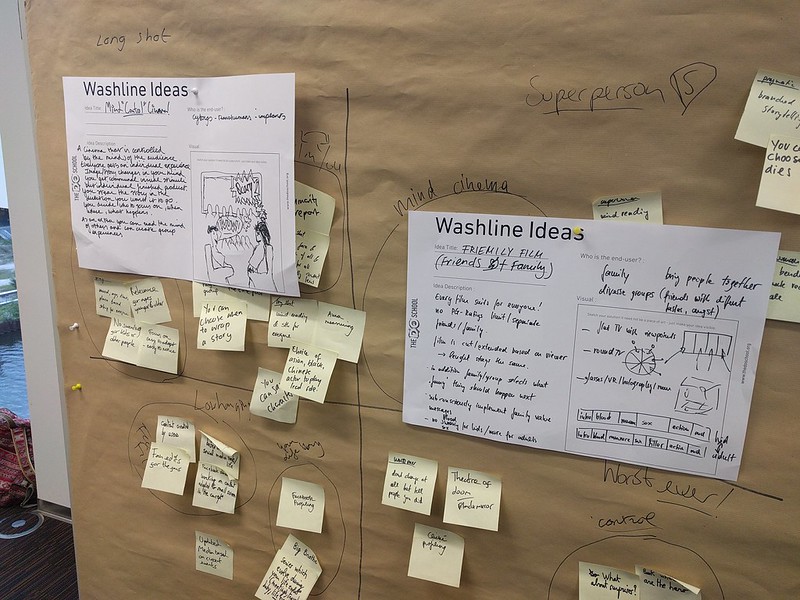I was at the excellent thinking digital conference yesterday when Paul Irwin from trylife took to the stage. Ironically he followed a excellent talk from Tatiana Simonian who made a clear call for more diversity and inclusion within the digital sector.
Sat in the 2nd row with my Nikon camera I was enjoying the story of his life and trylife (I was planning on talking to him afterwards) but I was caught in a state of flux. The words (ones which were not swear words) coming out of his mouth and seemed mismatched with his tshirt or choice of tshirt.
From my view it was a young female adult with a breast on show. Ok from my point of view quite tasteless but certainly something I can’t really imagine someone wearing at a professional conference. And I say that haven given talks about dating, love, sex and hookup culture. I was always sure to make my slides acceptable for a general audience. There is no way, even if I owned such clothes would I wear them on stage. This is all before I even looked at the conference code of conduct.
The last few conferences I have spoke at, I had needed to sign or least explicitly agree to the code of conduct in some way. I hadn’t really considered exactly why the speakers would need to do this, as the speakers should be onboard with this anyway? But now I totally get it.
I hasn’t noticed Thayer had already left for reasons I was still juggling in my mind.
Things got really concrete in my mind as Paul started talking about how he was helping young girls in trylife. I kept thinking how are you helping by wearing that tshirt? Did you not look in the mirror and think? Don’t you see the paradox which you have created?
This is when I started looking at the hashtag #tdc18 to see what others thought. This is when I saw Thayer’s tweets then I saw Christian’s one.
@herbkim I love you, I love your conference, but this was not ok. I've left, and an really upset. Please read the thread. I also feel strongly this is against the code of conduct for #tdc18. It is not ok for speakers to wear sexualised photos of women at a tech conference.
— Thayer Prime (@Thayer) May 17, 2018
I was struck because she was right and I was a fool to sit there wondering about this paradox which was opening up in front of me. Heck I even gave Paul a token finger clap (indicating how I was feeling at the time) while others cheered around me.
Cheers Andy & Sarah! FUCK IT gif attached. Procrastination graph coming when I get to work! x pic.twitter.com/01gbcvKqQM
— Mr Bingo (@Mr_Bingo) May 18, 2018
Some people will argue that Mr Bingo’s talk was even more sexualised and he did use the words “fuck it” but the context was very different. The actions, words and clothes of Mr Bingo were not mismatched, like Paul.
The message he delivered was truly soiled by his choice of t-shirt. The swearing I could put up with as it wasn’t aggressive (although also against the code of conduct) and but I couldn’t take him serious, and I know thats on me. But his choice of a sexualised t-shirt reflected badly on him and a great conference; and thats not good!
After the break Herb Kim apologized to everyone on stage and later on twitter.
apols for delayed reply. Made a public apology onstage immediately after it happened which I know @toodlepip @cubicgarden had mentioned. I thought that was enough but got a DM from @ggdworldwide suggesting I was ignoring the problem so just restating my apology again now
— Herb Kim (@herbkim) May 18, 2018
Someone close to me described it something like this…
People actions should equal what they say, especially on a stage.
What happened next is difficult to say as I wasn’t witness to any of it. But I heard clearly aggressive threatening behaviour from one of Paul’s friends at Thayer when she approached him to talk through things. The best thing he could have done was be understanding about things but judging by his twitter this was the last thing on his mind…
So controversial 😂 pic.twitter.com/nvKYGzPmt0
— Paul Irwin (@PaulRIrwin) May 17, 2018
Thayer you have my total support and I’m sorry I didn’t join you when you stood up and left.
Updated – 25th May
Herb the founder of Thinking Digital has issued a statement on his medium to what happened at Thinking Digital 2018. It includes a apology from Paul Irwin about what happened on the day.
Want to thank everyone at @ThinkingDigital for allowing me to present TryLife. The reception we received along with the support post event has been immense #TDC18 pic.twitter.com/Pynfeq06tp
— Paul Irwin (@PaulRIrwin) May 25, 2018
Updated – 30th May
Great news.
https://twitter.com/Thayer/status/1001569579607392256







































